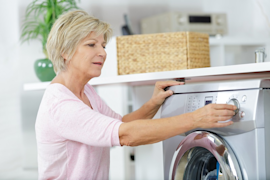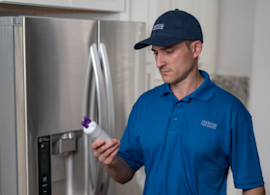- Kenmore refrigerator water filters
- Whirlpool refrigerator water filters
- Samsung refrigerator water filters
- GE refrigerator water filters
- LG refrigerator water filters
- Frigidaire refrigerator water filters
- KitchenAid refrigerator water filters
- Maytag refrigerator water filters
- Kenmore Elite refrigerator water filters
- Estate refrigerator water filters
- GE Profile refrigerator water filters
- Amana refrigerator water filters
- Bosch refrigerator water filters
- Dacor refrigerator water filters
- Electrolux refrigerator water filters
Kenmore 110 model Oasis top-load washer error codes

These error code explanations can help you diagnose a problem with your Kenmore Oasis top-load washer with a model number that starts with 110. For repair how-to help, visit the PartsDirect repair help section, which includes repair help for washing machines, other major appliances, lawn and garden equipment, garage door openers, vacuum cleaners and more. Search for your model number to find a complete list of replacement parts for your washer.
Error Code
Condition
DIY advice
LF or F30
Long fill
Check/Repair
If water isn't entering the washer, make sure that the water supply faucets are fully open. Check the fill hoses for kinks or freezing (in the winter). Check the inlet water valve screens for debris or deposits. Replace the inlet water supply valve assembly if the screens are clogged. If water is entering the tub but not being detected properly, then check the air hose between the bottom of the tub and the connection on the main electronic control board. If the air hose connection is okay, replace the main electronic control board (the water level sensor is a component of the main electronic control board).
Possible parts
Inlet water valve assembly, Main electronic control board
Ld or F32
Long drain time
Check/Repair
This code is displayed when the water level does not change after the drain pump runs. If the washer does not drain, check the drain hose and washer drain for a clog or restriction. Unplug the washer and check the drain pump for a clog. If the drain pump is defective, replace it. If the washer is draining properly and the drop in water level isn't being detected, then the main electronic control board will need to be replaced.
Possible parts
Drain pump, Main electronic control board
uL
Unbalanced load
Check/Repair
This code is steady on when an unbalanced load is detected and the washer runs a mini-cycle routine to balance the load. If the load cannot be balanced by that routine, then uL will flash and the door will unlock. You can redistribute the load and start the washer. If the tub bangs violently even with a balanced load then you may have a damaged suspension rod/spring assembly. Replace the suspension rods/springs in that situation.
Possible parts
Suspension Rods/Springs (replacement part has a set of 4 rods/springs -- replace all of them at once)
oL or F70
Overloaded
Check/Repair
The size of the load exceeds the washers capacity. Open the lid and remove some garments. Restart the cycle.
Possible parts
Sd or F71
Excessive suds
Check/Repair
Sd is displayed steady on when excessive suds is detected. The washer conducts a routine to eliminate the excessive suds. If the suds cannot be eliminated, then the Sd flashes in the display. Let the suds dissipate and then drain the washer. Use only the appropriate quantity of HE (High Efficiency) detergent in the washer.
Possible parts
HE detergent
lid or F81
Lid not closed or lid not opened between cycles
Check/Repair
This code appears if you press start with the lid open. It will also appear is you press Start after 2 consecutive cycles without opening the lid. If the lid lock/switch assembly isn't properly detecting the position of the washer lid (open/closed), then replace it.
Possible parts
Lid lock/switch assembly
HC
Hot & cold fill hoses are reversed
Check/Repair
Check the positions of the fill hoses on the back of the washer. If they are reversed, then connect them properly.
Possible parts
dL (F80, F82, F84 or F85)
Lid lock failure
Check/Repair
Check for debris in the lid lock mechanism that could prevent it from locking. Unplug the washer and check the wire harness connections for the lid lock/switch on the main electronic control board. Examine the lid lock/switch assembly. If it's damaged or defective, replace it.
Possible parts
Lid lock/switch assembly
dU or F83
Lid unlock failure
Check/Repair
Unplug the washer. Check the wire harness connections for the lid lock/switch assembly on the main electronic control board. If the connections are okay, then you will typically need to force the lid open. This will usually break the lid lock/switch assembly. Replace the lid lock/switch assembly if it's damaged or broken.
Possible parts
Lid lock/switch assembly
F01
Main electronic control board failure
Check/Repair
The main electronic control board is also called the machine control board. The F1 code indicates that the control board is defective. Try to reset the control board by unplugging the washer for 5 minutes. Plug it back in. This will sometimes fix the problem. If the F1 code returns after restoring power to the washer, replace the main electronic control board.
Possible parts
Main electronic control board
F02
User interface failure
Check/Repair
Unplug the washer. Open the console and check the wire harness connection between the main electronic control board and the user interface control board. If the wire harness connection is okay, then the user interface control board will need to be replaced.
Possible parts
User interface control board
F40
Water temperature thermistor failure
Check/Repair
The inlet water temperature thermistor (temperature sensor) is integrated into the inlet water valve assembly. Unplug the washer and check the wire harness connection between the main electronic control board and the thermistor on the inlet water valve assembly inside the console. If the wiring harness connection is okay, then the inlet water valve assembly will usually need to be replaced.
Possible parts
Inlet water valve assembly
F41
Motor RPS failure
Check/Repair
The motor RPS (Rotor Position Sensor) detects the speed of the drive motor. Unplug the washer and check the wire harness connections between the RPS and the main electronic control board. If the wire harness connections are okay, then the RPS will usually need to be replaced.
Possible parts
Motor RPS sensor
F44
Heater relay failed
Check/Repair
On washers with a heating element, unplug the washer and replace the main electronic control board because the heater relay on that board is defective. For washers without a heating element, replace the user interface control board because a diode on the user interface control board is defective. If you just installed a new user interface control board when this code appears, then you likely installed an incompatible user interface control board. Check the user interface control board part number and then order and install the correct part.
Possible parts
Main electronic control board, user interface control board
F50
Motor stalled
Check/Repair
The motor RPS (Rotor Position Sensor) detects no rotation of the drive motor. Unplug the washer. Check to see if the basket spins freely. If not, then examine the drive system and eliminate the cause of friction. If the basket spins freely, check the wire harness connections between the main electronic control board and the motor. If the wire harness connections are okay, check the drive motor. If the motor is defective, replace it.
Possible parts
Drive motor, wire harness
F51
Motor RPS failure
Check/Repair
The motor RPS (Rotor Position Sensor) detects the speed of the drive motor. Check to see if the basket spins freely. If not, then examine the drive system and eliminate the cause of friction. If the basket spins freely, unplug the washer and check the wire harness connections between the RPS and the main electronic control board. If the wire harness connections are okay, then the RPS will usually need to be replaced.
Possible parts
Motor RPS sensor
F52
Motor stop failure
Check/Repair
Drive motor failed to stop after the stop command from the main electronic control board. This is caused by a failure in the main electronic control board. The main electronic control board will usually need to be replaced to fix this failure.
Possible parts
Main electronic control
F53
Motor control over-temperature
Check/Repair
The motor control portion of the main electronic control board is overheating. This can be caused by a high current draw through the motor circuit due to excessive friction in the drive system. Check to see if the basket spins freely. If not, examine and repair the cause of the excessive friction. If the basket spins freely, then the drive motor and/or the main electronic control board may need to be replaced.
Possible parts
Drive motor, Main electronic control board
F54
Motor control overcurrent
Check/Repair
The motor control portion of the main electronic control board is drawing high current. This can be caused by excessive friction in the drive system. Check to see if the basket spins freely. If not, examine and repair the cause of the excessive friction. If the basket spins freely, then the drive motor and/or the main electronic control board may need to be replaced.
Possible parts
Drive motor, Main electronic control board
F72
Basket re-engagement failure
Check/Repair
The basket fails to engage the drive system for the spin mode. Check to see if the water drained out. If not, run a drain & spin routine to evacuate the water. If the basket still won't engage, check the drive system for an obstruction or failure.
Possible parts
Drive system components
Most common symptoms to help you fix your washers
Choose a symptom to see related washer repairs.
Main causes: clogged drain hose, house drain clogged, bad drain pump, water-level pressure switch failure, bad control b…
Main causes: worn agitator dogs, bad clutch, broken motor coupler, shifter assembly failure, broken door lock, suspensio…
Main causes: bad lid switch or door lock, bad timer or electronic control board, wiring failure, bad water inlet valve a…
Main causes: broken lid switch or lid lock, bad pressure switch, broken shifter assembly, faulty control system…
Main causes: unbalanced load, loose spanner nut, worn drive block, broken shock absorber or suspension spring, debris in…
Main causes: no water supply, bad water valves, water-level pressure switch failure, control system failure, bad door lo…
Main causes: lack of electrical power, wiring failure, bad power cord, electronic control board failure, bad user interf…
Main causes: leaky water inlet valve, faulty water-level pressure switch, bad electronic control board…
Main causes: water heater failure, bad water temperature switch, faulty control board, bad water valve, faulty water tem…
Most common repair guides to help fix your washers
Effective articles & videos to help repair your washers
Use the advice and tips in these articles and videos to get the most out of your washer.

Find tips for using your washing machine efficiently to save energy and help reduce utility bills.…

Learn about all the convenient features on our Sears PartsDirect website that make your parts purchases easier.…

Get answers to frequently asked questions about Sears and Sears PartsDirect.…